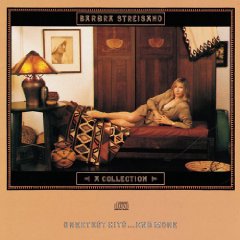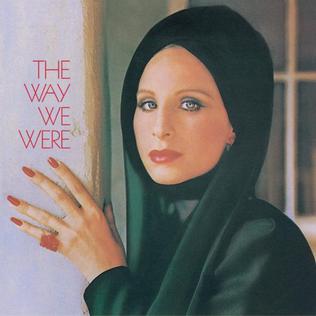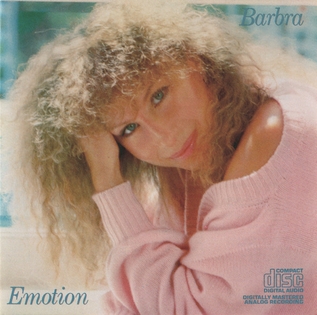
The Movie Album is the thirtieth studio album by American singer Barbra Streisand, released on October 14, 2003, by Columbia Records. Overall, her sixtieth release with her record label, it was executively produced by Streisand and her manager, Jay Landers. A concept album, it contains twelve songs from the singer's favorite films ranging in release from 1935 to 1988. While curating the album, Streisand was inspired by her marriage to actor James Brolin to record songs about love and relationships. To better fit her needs, songwriting duo Alan and Marilyn Bergman were commissioned to add lyrics to several of the songs Streisand had chosen to record.

A Collection: Greatest Hits...and More is the fourth greatest hits album recorded by American vocalist Barbra Streisand. It was released on October 3, 1989 by Columbia Records. The compilation features ten songs from Streisand's career, dating from 1975 to 1988, plus two previously unreleased songs: "We're Not Makin' Love Anymore" was released as the album's lead single on September 14, 1989, and "Someone That I Used to Love" was distributed as the second and final one in 1989. Both singles charted on several record charts internationally.

The Essential Barbra Streisand is the fifth greatest hits album by American singer Barbra Streisand, released on January 29, 2002, by Columbia Records. The compilation features 38 songs from Streisand's catalog, in addition to two previously unreleased tracks. It includes material from 26 of the singer's albums and was described as a collection of, mainly, her pop songs. A reissued version of the compilation was distributed by Columbia and Legacy Recordings in 2008 and includes a bonus disc featuring nine additional songs from Streisand's discography.

Duets is a compilation album by American singer Barbra Streisand, released on November 26, 2002, by Columbia Records. The collection features nineteen duets from Streisand's career, including two newly recorded ones: "I Won't Be the One to Let Go" with Barry Manilow and "All I Know of Love" with Josh Groban. The Manilow duet was released as the album's lead single on November 4, 2002, as a streaming-only exclusive for AOL Music website members.

The Way We Were is the fifteenth studio album recorded by American singer Barbra Streisand. The album was released in January 1974, preceded by the commercial success of its lead single "The Way We Were" first released in September 1973.

Emotion is the twenty-third studio album by American singer Barbra Streisand, released in October 1984 by Columbia Records. It was her first studio album in four years after the release of Guilty, which has since become her highest selling studio album worldwide.

Lazy Afternoon is the seventeenth studio album recorded by American singer Barbra Streisand. It was released on October 14, 1975, by Columbia Records. Following a mixed critical response to her previous studio album, ButterFly (1974), the singer began working with new musicians for the project. Recorded in April 1975 in Los Angeles, Lazy Afternoon contains pop standards. Producer Rupert Holmes wrote three songs on the album and co-wrote a fourth, "By the Way", with Streisand. She also included a few cover songs, such as the Four Tops' "Shake Me, Wake Me ", Stevie Wonder's "You and I", and Libby Holman's "Moanin' Low".

ButterFly is the sixteenth studio album by American singer Barbra Streisand. Released on October 1, 1974, by Columbia Records, it marked Streisand's first album of entirely new material in over three years. Primarily a contemporary pop record recorded throughout 1974, it also incorporates music from the reggae and R&B genres. All of the tracks on ButterFly are cover songs produced by Streisand's then-boyfriend Jon Peters, originating from artists like Bob Marley, David Bowie, Evie Sands, and Graham Nash.

Barbra Streisand...and Other Musical Instruments is the fourteenth studio album by American singer Barbra Streisand. It was released on November 2, 1973, by Columbia Records. The album was made available following a 1973 live television special promoted to improve Streisand's image and sound. With world music as the primary genre, the album's instrumentation varies greatly; even items such as kitchen utensils were used to create melodies and beats. With a majority of the songs on the album being cover songs, Streisand also re-recorded various tracks that originated earlier in her career. Her manager, Martin Erlichman, was credited as the album's sole and executive producer.

The Owl and the Pussycat is the soundtrack album to the 1970 American film of the same name. Released by Columbia Records, it features film dialogue by Barbra Streisand and George Segal recorded over music performed by American band Blood, Sweat & Tears. The album's five tracks were all written by Buck Henry, produced by Thomas Z. Shepard.

"Didn't We" is a song recorded by Irish singer and actor Richard Harris for his debut studio album, A Tramp Shining (1968). It was written and produced by Jimmy Webb and originally served as the B-side to Harris' 1968 single "MacArthur Park". "Didn't We" was then distributed as the record's single by Dunhill Records, also in 1968. A traditional pop song, Harris sings about his life in the past. Commercially, it charted at lower positions of both the United States and Canada, and in the higher ranks of their Adult Contemporary component charts. Harris featured "Didn't We" on several of his greatest hits albums, including The Richard Harris Collection: His Greatest Performances from 1973. That same year, the song was reissued as a promotional single paired alongside his 1971 single "My Boy".

Yentl is a soundtrack album to the film of the same name by American singer Barbra Streisand. It was released on November 8, 1983, by Columbia Records. The album was produced by Streisand and Alan and Marilyn Bergman, and arranged and conducted by Michel Legrand. The music is by Legrand and the lyrics by the Bergmans. The album peaked at No. 9 on the Billboard Top 200 LP chart was gold and platinum status on January 9, 1984, by the RIAA for shipping 500,000 and 1 million copies, respectively.

"Guava Jelly" is a song recorded by the Jamaican group Bob Marley and the Wailers. It was released as a 7" vinyl single through Tuff Gong and Green Door Records. It was issued commercially with B-side track "Redder Then Red", which was misspelled on its initial printing, in 1971. It was written and produced by Marley and features uncredited lyrical contributions from Bunny Livingston. A reggae composition like the majority of Marley's works, "Guava Jelly" contains a rocksteady and island-like production with lyrics loosely based around sexual intercourse. His use of the term "guava jelly" was likely referring to a specific type of sexual lubricant. It was favorably viewed by several reviewers, with many of them finding the composition to be sexual and about love. The group placed "Guava Jelly" on several compilation albums, including Africa Unite: The Singles Collection in 2005, and Owen Gray and Herbie Mann created their own versions in 1974 and 1975, respectively.

"All in Love Is Fair" is a song by American singer-songwriter Stevie Wonder recorded for his sixteenth studio album, Innervisions (1973). Written and produced by Wonder, it was released as a 7" single in Brazil in 1974. The song is a pop ballad with lyrics that describe the end of a relationship through the use of clichés. Critical reaction to the song has been varied: Matthew Greenwald of AllMusic wrote that it was among Wonder's "finest ballad statements", but Robert Christgau felt that the singer's performance was "immature". Wonder has included it on several of his greatest hits albums, including the most recent, 2005's The Complete Stevie Wonder.

"How Lucky Can You Get" is a song recorded by American vocalist Barbra Streisand for the official soundtrack to the 1975 film Funny Lady. It was released as a 7" single in April 1975 through Arista Records. The song was written by Fred Ebb and John Kander, while production was handled by Peter Matz. "How Lucky Can You Get" is one of the new songs on the soundtrack, with its origins coming from Fanny Brice, the character Streisand portrays in the aforementioned film. The music pertains to Brice herself, particularly the sarcastic nature of the lyrics that are accompanied by an "insistent" melody and production. It was suggested that the pattern of the lyrics may have been influenced by Giacomo Puccini's 1896 opera, La bohème.

"We're Not Makin' Love Anymore" is a song recorded by American singer Barbra Streisand for her fourth greatest hits album, A Collection: Greatest Hits...and More (1989). It was released on September 14, 1989 by Columbia Records on 7-inch, 12-inch, cassette, and CD. It was written by Michael Bolton and Diane Warren and produced by Narada Michael Walden. Bolton's inspiration for the song was derived from his divorce; he and Warren debated what singer would be able to sing their work well and ultimately decided that Streisand would be the right fit. The song is a ballad that is similar in sound to Streisand's "Comin' In and Out of Your Life" (1981).

"I Won't Be the One to Let Go" is a song recorded by American singers Barbra Streisand and Barry Manilow for the former's sixth compilation album, Duets (2002). It was released as the album's only single on November 4, 2002, by Columbia Records. The track was written and produced by Richard Marx with additional songwriting coming from Manilow and additional production handled by Walter Afanasieff. Initially an airplay and streaming-only single in the United States, a promotional CD single of "I Won't Be the One to Let Go" was released and includes the radio edit and album version of the song.

"Stranger in a Strange Land" is a song recorded by American singer Barbra Streisand for her 31st studio album, Guilty Pleasures (2005). It was released as the album's lead single on August 16, 2005, by Columbia Records. The track was written by Ashley Gibb, Barry Gibb and Stephen Gibb while production was handled by Barry Gibb and John Merchant. It serves as the first of 11 reunion collaborations with Barry Gibb, who Streisand had last collaborated with on Guilty (1980). The single was released digitally and physically distributed on CD and DVD, with some editions including the song's official music video.

"Night of My Life" is a song recorded by American singer Barbra Streisand for her 31st studio album, Guilty Pleasures (2005). It was released as the album's second single on September 27, 2005, by Columbia Records. The track was written by Ashley Gibb and Barry Gibb while production was handled by Barry Gibb and John Merchant. It serves as one of Streisand's first of 11 reunion collaborations with Barry Gibb since their work on her album Guilty in 1980. It was released digitally and on 12" and CD in five different formats, each including various remixes of the single.

Funny Lady is the soundtrack album of the 1975 musical film of the same title, starring Barbra Streisand. Released by Arista Records on March 15, 1975, arranged, conducted, and coordinated by Peter Matz, the album's fifteen tracks are performed by Streisand, James Caan, and Ben Vereen. A sequel to the 1968 musical comedy-drama Funny Girl, the songs extend the semi-biographical account of the life of American performer Fanny Brice. Funny Lady also included songs written by Brice's third husband Billy Rose. New music by Kander and Ebb included "How Lucky Can You Get", the album's only single, released in April 1975.




















